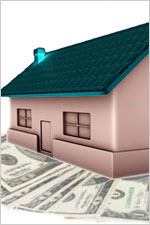What is a Reverse Mortgage?
 A Reverse Mortgage or Reverse Home Mortgage is designed for seniors over 62 years of age to improve their retirement life style. The reverse mortgage has exploded in recent years, due to growing popularity. Beauty of a Reverse Home Mortgage is that you get all the benefits of selling your house and all the benefits of getting a home equity loan - but you can still live in and retain ownership of your home and you don't have to make any payments against the loan over time. Reverse mortgages in essence are designed to help retirees with limited income use the wealth in their home to pay for retirement expenses like health care and monthly living expenses.No matter how you structure a Reverse Mortgage, there are absolutely no restrictions on how the proceeds of the loan may be used, you typically don't pay anything back until you die, sell your home, or permanently move out. On top of that, your ability to secure a Reverse Mortgage is not dependent on your credit history, income level, health or any other factors that might make a home equity loan expensive or problematic.
A Reverse Mortgage or Reverse Home Mortgage is designed for seniors over 62 years of age to improve their retirement life style. The reverse mortgage has exploded in recent years, due to growing popularity. Beauty of a Reverse Home Mortgage is that you get all the benefits of selling your house and all the benefits of getting a home equity loan - but you can still live in and retain ownership of your home and you don't have to make any payments against the loan over time. Reverse mortgages in essence are designed to help retirees with limited income use the wealth in their home to pay for retirement expenses like health care and monthly living expenses.No matter how you structure a Reverse Mortgage, there are absolutely no restrictions on how the proceeds of the loan may be used, you typically don't pay anything back until you die, sell your home, or permanently move out. On top of that, your ability to secure a Reverse Mortgage is not dependent on your credit history, income level, health or any other factors that might make a home equity loan expensive or problematic.
The major eligiblity criteria for most Reverse Mortgages is that you must own and reside in your home and be a senior 62 years of age or older. (In most cases second homes, apartment buildings and homes less than a year old are not eligible for a reverse mortgage.) The most popular reverse mortgage is the Home Equity Conversion Mortgage, or HECM. HECM Loans are administered and insured by the FHA (Federal Housing Administration) and it's completely safe.
Amount you get as a result of reverse mortgage loan is not taxable, and in most cases do'nt affect other benefits like Social Security or Medicare. You retain the title to your home and do not have to make monthly repayments. The loan must be repaid when the last surviving borrower dies, sells the home, or no longer lives in the home as a principal residence. In the HECM program, a borrower can live in a nursing home or other medical facility for up to 12 months before the loan becomes due and payable.
Key factors that make a reverse mortgage attractive are:
- No repayment of the loan as long as the borrower occupies the property as his/her primary residence.
- Income, asset, or credit qualifications doesn't play a role.
- Homeowners retain title to their home.
- In most cases no tax or benefit deductions on the proceeds used as "income".






